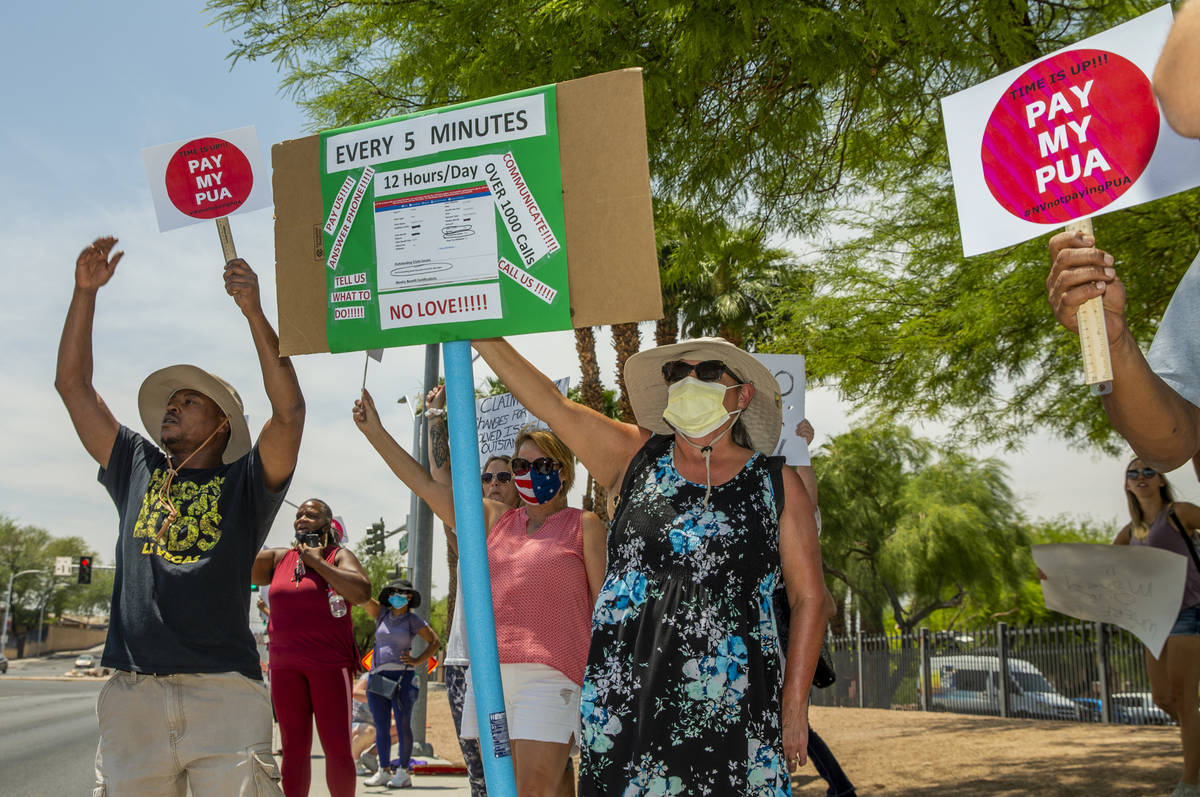Ex-DETR employees talk avoiding fraud vs paying jobless claims quickly
Nevada’s employment department says it can’t pay a claim until it’s proved legitimate.
The Department of Employment, Training and Rehabilitation has cited guidance from its own boss, the U.S. Department of Labor, while making that argument in a lawsuit filed against the agency. The lawsuit was filed in May on behalf of self-employed workers and independent contractors seeking immediate payments after weeks of delays.
A Labor Department official wrote in a report prepared during the court case that a state employment agency must also implement safeguards for catching and stopping fraud. Otherwise, the official wrote, a state risks losing federal grants to keep the programs running.
Scrutiny regarding fraud and overpayment cannot be relaxed in order to provide benefits faster, the department said.
But former DETR employees told the Review-Journal the state agency could be doing a better job preventing fraud while paying out jobless claims quickly.
“There’s a balance that has to be struck there, and it’s not being struck,” said Steve Zuelke, a former fraud manager for the department.
‘Get the money out’
DETR declined to comment on its handling of fraud. The department couldn’t be reached for comment to respond to its former employees.
Fraud shouldn’t cause DETR to “throw out the baby with the bathwater, assuming that everyone is fraudulent until they’re able to prove otherwise,” he said. Zuelke worked at DETR for 25 years and retired in 2016.
Another former adjudicator, Laura Feher, said there are safeguards to detect fraud and fraud has always been a problem.
“Most of the people that are committing fraud are very, very savvy, and they’ve done it before,” she said.
Most claims are legitimate and from people who are just trying to feed their families, she said. Feher worked at DETR for 10 years and retired last year.
Though DETR argues that it can’t be lenient in paying out claims, one of Zuelke’s former employees, April Crooks, said that’s essentially how the department operated during the first half of the 2010s.
“It used to be, ‘Get the money out; get the money out,’” said Crooks, who spent three of her five years at DETR as a fraud investigator.
She said that when presented with possible fraudulent claims, it was better to err on the side of getting money in people’s hands. The claim was then sent to the fraud department, where she and her colleagues would call around and try to verify a claim’s legitimacy.
Oftentimes, if a claim was erroneously paid, it was not purposeful fraud but an individual who had made a mistake in the claim, she said.
DETR officials have said many claims suspected of fraud were filed with IP addresses in other states or countries. Crooks said one possible explanation for that is that a virtual private network, or VPN, is masking an IP address location as being somewhere else in the world. They are more common now than they were when she left DETR in 2015, she said.
The department’s employment security division acknowledged in the special court report that “it is possible” VPNs could be an explanation for some claims with IP addresses. DETR said that in those cases, it is requiring claimants to call in and file their claim.
Still, Crooks thinks the department could first approve those claims and then have a fraud investigator follow up with claimants to verify their identity and, if it’s a fraudulent claim, pursue them criminally. DETR indicated in the court report that it requires claimants to call and submit a claim if there’s a suspect IP address.
“But the easiest way they could resolve that is to pay it out,” Crooks said.
Passing the buck?
But that kind of pay now, pursue later approach wouldn’t work, argues another former DETR adjudicator, who spoke on the condition of anonymity to protect her safety and future job prospects.
The former employee said the department is acting appropriately by vetting claims for fraud before paying them out. To do otherwise, she said, passes the buck from adjudicators to fraud investigators, who would then be tasked with chasing down potentially millions in payments to fraudsters.
Fraud is a legitimate reason to hold up so many claims, she said, but the department has sent the wrong message by emphasizing fraud and not asking for the public’s help in finding alternative ways to pay claims and streamline the claims verification process.
“You can still have the key to the bank vault and be nice about it,” said the adjudicator, who worked for the department during the Great Recession.
The former DETR adjudicator is now a traditional benefits claimant herself, having lost her job of eight years as a human resources manager within the past year. She said a DETR call line waiting tone provides a warning about fraud underscored by police siren sound effects.
She called it a “scare tactic.”
“We get it. They’re handling money,” she said. “But you don’t call Medicaid and hear sirens in the background. This is a time people need help.”
Contact Mike Shoro at mshoro@reviewjournal.com or 702-387-5290. Follow @mike_shoro on Twitter.











































